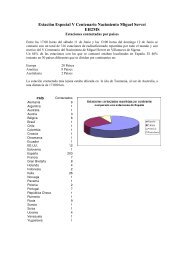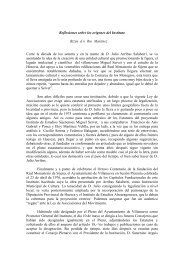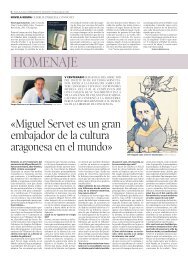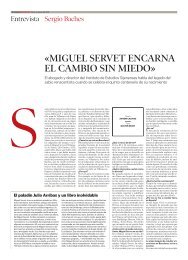New Page
New Page
New Page
Create successful ePaper yourself
Turn your PDF publications into a flip-book with our unique Google optimized e-Paper software.
through the serpent in heaven, on earth<br />
and in paradise itself. Intercourse with<br />
the unclean spirit rendered unclean the<br />
heaven, the earth and the terrestrial paradise.<br />
The heaven became unclean since<br />
sin was found in God's angels, as Job<br />
says. The serpent so contaminated and<br />
polluted everything, the sun, the moon<br />
and the stars that for the same reason that<br />
we have to become ash, the heaven<br />
himself, along with the sun, the moon<br />
and the stars will have to be destroyed by<br />
fire on the day of judgement."88<br />
company of the unclean spirit, likewise the earth was<br />
contaminated, the heaven because sin was found in<br />
God's angels as it is written in Job four and 19.<br />
The sun, the moon, the stars are contaminated<br />
and obscured so much that they have to become dirt<br />
like us and consumed by fire. Indeed, hell, death and all<br />
diseases were introduced by him."89<br />
In the process of the interpretation of rebirth the typically Servetian idea that the renovation in the<br />
inner man is a simultaneously spiritual and physical process is leached out. With Dávid, on the contrary,<br />
Sozzini's spiritual notion of +creating new" is dominant, but the effort to blend the ideas of the two<br />
Antitrinitarian predecessors is clearly perceptible.<br />
A similar tendency can be observed while attending to another problem. How has it become<br />
necessary to be reborn for those who are in heaven since angels do not sin? -- Dávid asks on behalf of his<br />
predictable opponents. The answer, in keeping with Lelio Sozzini, but also tangentially related to Servet,<br />
is that while Adam's sin corrupted human nature, the fall of the first angels corrupted their nature. While,<br />
however, Brevis explicatio only briefly mentions that the Scripture is silent about the creation and fall of<br />
the angels, and says very little on their restoration, this silence was visibly problematic for the author of<br />
Rövid útmutatás, who visibly found it difficult to accept this silence and also the fact that this doctrine is<br />
hard to grasp: +If we do not understand how the angels were reconciled with God, we cannot know either<br />
when and how the angels were created and fell, thus it is no wonder we know so little about their<br />
reconciliation and that Christ being their head since the Scripture makes but brief mention of it. The<br />
conditions of man are rather and more openly explained and, therefore, its structure is also given more<br />
clearly in the Scripture because it is more useful and more necessary for us to know these than the<br />
structure and reconciliation of the heavens."90 We shall see later how Dávid's job during the later debates<br />
was made harder by the silence of the Scripture. On the other hand, the fact that Sozzini's treatise still<br />
emphasized, though without elaborating in detail, the necessity of the renovation of the angels meant for<br />
Dávid a point of connection between the ideas of Brevis explicatio and Servet's theory.<br />
Following the order of the said contrasting pairs, the work barely mentions the two births, the two<br />
educations and two lives, and says a little more about the two kinds of death. This part is especially interesting<br />
because if earlier the work relied on Servet to the extent of a sentence or an expression, now this<br />
train of thought in its entirety comes from Restitutio. The way it is utilized is again rather arbitrary here.<br />
The problem is discussed by Servet not for its own sake but the first book of De regeneratione superna<br />
addresses the question whether unbaptized children will be damned. A denial of this leads to the<br />
discussion of the consequences of Adam's sin and of the possibilities of man, the difference between the<br />
two deaths being explicated several times in the process. Dávid uses approximately a page length text of<br />
that long chapter, strictly omitting the comments referring to the basic idea of the chapter, doubtlessly<br />
obscuring thereby also the Servetian genesis of the passage. The following quotation, however, not only<br />
justifies that but allows an insight into the methods of the Hungarian Antitrinitarian as well.<br />
+So that we can show the whole +The first and the second death were both the<br />
32







